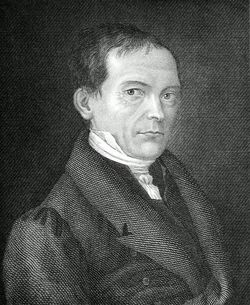Difference between revisions of "Wilhelm Martin Leberecht De Wette (1780-1849), scholar"
Jump to navigation
Jump to search
(→Books) |
|||
| Line 1: | Line 1: | ||
[ | [[File:Wette.jpg|thumb|250px|Wilhelm Martin Leberecht De Wette]] | ||
[http://upload.wikimedia.org/wikipedia/commons/thumb/8/87/Wilhelm_martin_leberecht_de_wette.jpg/492px-Wilhelm_martin_leberecht_de_wette.jpg Wilhelm Martin Leberecht De Wette] (1780-1849) was a German scholar. A student of [[Johann Jakob Griesbach]] and [[Heinrich Paulus]] at the University of Jena, was professor at the University of Heidelberg. Renowned for his groundbreaking studies on the origins of the Pentateuch, gave an important contribution also to New Testament studies. Distinguished three theological strands in the New Testament: the Jewish-Christian (in the Synoptic Gospels, most of Acts, the letters of James, Peter and Jude, and the Apocalypse), the Alexandrian (in Hebrews and the Johannine Gospel and letters) and the Pauline. These represent three separate lines along which the message of Jesus was interpreted and developed. | |||
A student of [[Johann Jakob Griesbach]] and [[Heinrich Paulus]] at the University of Jena, was professor at the University of Heidelberg. Renowned for his groundbreaking studies on the origins of the Pentateuch, gave an important contribution also to New Testament studies. Distinguished three theological strands in the New Testament: the Jewish-Christian (in the Synoptic Gospels, most of Acts, the letters of James, Peter and Jude, and the Apocalypse), the Alexandrian (in Hebrews and the Johannine Gospel and letters) and the Pauline. These represent three separate lines along which the message of Jesus was interpreted and developed. | |||
==Works | ==Works== | ||
====Books==== | ====Books==== | ||
| Line 11: | Line 10: | ||
**[[A Critical and Historical Introduction to the Canonical Scriptures of the Old Testatment = Beiträge zur Einleitung in das Testament (1843 @1808-09 De Witte / Parker), book (English ed.)]] | **[[A Critical and Historical Introduction to the Canonical Scriptures of the Old Testatment = Beiträge zur Einleitung in das Testament (1843 @1808-09 De Witte / Parker), book (English ed.)]] | ||
***[[Lehrbuch der historisch-kritischen einleitung in die kanonischen und apokryphischen bücher des Alten Testaments (A Critical and Historical Introduction to the Canonical and Apocryphal Scriptures of the Old Testament (1869 De Wette, Schrader), book]] | ***[[Lehrbuch der historisch-kritischen einleitung in die kanonischen und apokryphischen bücher des Alten Testaments (A Critical and Historical Introduction to the Canonical and Apocryphal Scriptures of the Old Testament (1869 De Wette, Schrader), book]] | ||
*[[Lehrbuch der historisch kritischen Einleitung in die kanonischen Bücher des Neuen Testaments (An Historico-Critical Introduction to the Canonical Books of the New Testament / 1826 De Wette), book]] | *[[Lehrbuch der historisch kritischen Einleitung in die kanonischen Bücher des Neuen Testaments (An Historico-Critical Introduction to the Canonical Books of the New Testament / 1826 De Wette), book]] | ||
**[[An Historico-Critical Introduction to the Canonical Books of the New Testament = Lehrbuch der historisch kritischen Einleitung in die kanonischen Bücher des Neuen Testaments (1858 @1826 De Witte / Frothingham), book (English ed.)]] | **[[An Historico-Critical Introduction to the Canonical Books of the New Testament = Lehrbuch der historisch kritischen Einleitung in die kanonischen Bücher des Neuen Testaments (1858 @1826 De Witte / Frothingham), book (English ed.)]] | ||
*[[Lehrbuch der historisch kritischen Einleitung in die kanonischen Bücher des Neuen Testament (An Historico-Critical Introduction to the Canonical Books of the New Testament / 1869 De Wette, Schrader), book]] | *[[Lehrbuch der historisch kritischen Einleitung in die kanonischen Bücher des Neuen Testament (An Historico-Critical Introduction to the Canonical Books of the New Testament / 1869 De Wette, Schrader), book]] | ||
==Biography== | |||
*[https://en.wikipedia.org/wiki/Wilhelm_Martin_Leberecht_de_Wette Wikipedia.en] -- [https://de.wikipedia.org/wiki/Wilhelm_Martin_Leberecht_de_Wette Wikipedia.de] -- [https://fr.wikipedia.org/wiki/Wilhelm_Martin_Leberecht_de_Wette Wikipedia.fr] -- Wikipedia.it -- Wikipedia.es | |||
==References== | ==References== | ||
*[[William Baird]], in [[History of New Testament Research: 1. From Deism to Tübingen (1992 Baird), book]] / pp. 221-229 | *[[William Baird]], in [[History of New Testament Research: 1. From Deism to Tübingen (1992 Baird), book]] / pp. 221-229 | ||
*[[Historical Handbook of Major Biblical Interpreters (1998 McKim), edited volume]] | |||
*[http://www.kirchenlexikon.de/d/de_wette_w_m_l.shtml BBKL.de] | |||
[[Category:Scholars|De Wette]] | [[Category:Scholars|De Wette]] | ||
Latest revision as of 08:47, 7 December 2013
Wilhelm Martin Leberecht De Wette (1780-1849) was a German scholar. A student of Johann Jakob Griesbach and Heinrich Paulus at the University of Jena, was professor at the University of Heidelberg. Renowned for his groundbreaking studies on the origins of the Pentateuch, gave an important contribution also to New Testament studies. Distinguished three theological strands in the New Testament: the Jewish-Christian (in the Synoptic Gospels, most of Acts, the letters of James, Peter and Jude, and the Apocalypse), the Alexandrian (in Hebrews and the Johannine Gospel and letters) and the Pauline. These represent three separate lines along which the message of Jesus was interpreted and developed.
Works
Books
- Beiträge zur Einleitung in das Testament = A Critical and Historical Introduction to the Canonical Scriptures of the Old Testatment (1808-09 De Witte), book
- Lehrbuch der historisch kritischen Einleitung in die kanonischen Bücher des Neuen Testaments (An Historico-Critical Introduction to the Canonical Books of the New Testament / 1826 De Wette), book
- Lehrbuch der historisch kritischen Einleitung in die kanonischen Bücher des Neuen Testament (An Historico-Critical Introduction to the Canonical Books of the New Testament / 1869 De Wette, Schrader), book
Biography
- Wikipedia.en -- Wikipedia.de -- Wikipedia.fr -- Wikipedia.it -- Wikipedia.es
